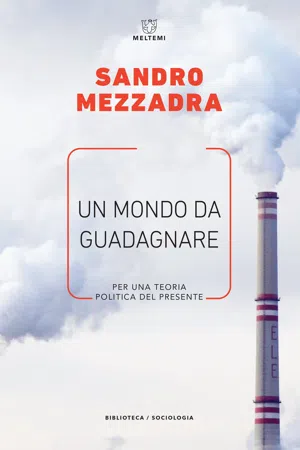
- English
- ePUB (mobile friendly)
- Available on iOS & Android
About this book
In Un mondo da guadagnare Sandro Mezzadra, tra i più apprezzati teorici critici contemporanei, presenta una sintesi delle sue ricerche dell'ultimo decennio, culminate nei fortunati volumi scritti con Brett Neilson sui confini e le spazialità della logistica, rilanciando sul piano dell'analisi delle dinamiche del capitalismo contemporaneo e interrogandosi sulle prospettive politiche che si aprono nel presente. Le migrazioni, l'impatto della crisi economica, il declino delle forme tradizionali della democrazia, l'emergere di nuove spazialità politiche, le forme mutevoli assunte dal lavoro e dalle dinamiche di valorizzazione del capitale: questi e altri temi sono vagliati alla luce di un dialogo con i "classici", Du Bois, Fanon, Foucault e, soprattutto, Marx, a partire dall'esigenza di rintracciare il filo rosso che lega fenomeni troppo spesso analizzati in maniera parziale e isolata. Un mondo da guadagnare si presenta quindi non solo come un contributo critico sul presente, ma anche, e soprattutto, come un testo militante, che si vuole interno alle lotte presenti e a venire.
Frequently asked questions
- Essential is ideal for learners and professionals who enjoy exploring a wide range of subjects. Access the Essential Library with 800,000+ trusted titles and best-sellers across business, personal growth, and the humanities. Includes unlimited reading time and Standard Read Aloud voice.
- Complete: Perfect for advanced learners and researchers needing full, unrestricted access. Unlock 1.4M+ books across hundreds of subjects, including academic and specialized titles. The Complete Plan also includes advanced features like Premium Read Aloud and Research Assistant.
Please note we cannot support devices running on iOS 13 and Android 7 or earlier. Learn more about using the app.
Information
Table of contents
- Introduzione
- Parte prima Politica
- Capitolo primo Nella crisi della forma politica moderna. Tracce federali
- Capitolo secondo Prendere l’Europa. Gestione della crisi, trasformazioni costituzionali, movimenti costituenti
- Capitolo terzo Il primato della lotta. Temi marxiani nell’opera di Michel Foucault
- Parte seconda Migrazioni
- Capitolo primo Autonomia delle migrazioni. Lineamenti di un approccio teorico
- Capitolo secondo Che cosa è in gioco nella mobilità del lavoro? Migrazioni, confini, capitalismo contemporaneo
- Capitolo terzo Moltiplicazione dei confini e pratiche di mobilità
- Capitolo quarto Prospettive abolizioniste sull’umano.Lotte di confine, migrazioni e libertà di movimento
- Parte terza Mondi
- Capitolo primo Quante sono le storie del lavoro? Verso una teoria del capitalismo postcoloniale
- Capitolo secondo Questione di sguardi. Du Bois e Fanon
- Capitolo terzo Nei territori dell’estrazione. Continuità coloniali, assemblaggi postcoloniali di potere, lotte anticoloniali
- Epilogo Per la critica del capitalismo globale: un progetto “marxiano”?
- Riferimenti bibliografici